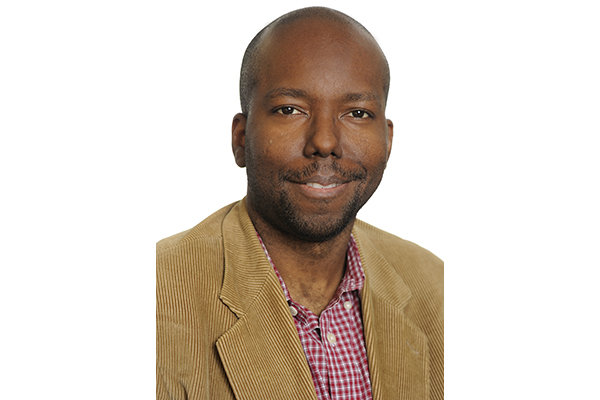With great sadness we are writing to share that Carlton Haywood, Jr., MA, PhD ‘09, passed away on December 31, 2021. Dr. Haywood was a beloved colleague, a core faculty member at the Johns Hopkins Berman Institute of Bioethics, core faculty at the Welch Center for Prevention, Epidemiology, and Clinical Research, and an assistant professor in the Division of Hematology at the Johns Hopkins School of Medicine.
Born January 26, 1977, in Atlanta, Georgia, Carlton was diagnosed with sickle cell disease as a young child. Despite repeated hospitalizations for painful crises, Carlton remained a straight A student and attended the University of Virginia where he earned a Bachelor of Arts in Religious Studies (1999) followed by a Masters in Bioethics (2003). He then moved to Baltimore, where in he completed a Doctorate of Philosophy in Health Policy and Bioethics in the Department of Health Policy and Management at the Johns Hopkins Bloomberg School of Public Health (2009). As a PhD student, Carlton was awarded a competitive NIH-funded individual NRSA grant. He joined the faculty of the Department of Hematology with support from the Johns Hopkins University Office of the Provost Mosaic Initiative. In recognition of his academic achievements, leadership, and numerous contributions to the field, upon graduating with his doctorate, he was also inducted into the Alpha Chapter of the Delta Omega Public Health Honor Society (2009).
Carlton brought a unique perspective to his health equity research, which was informed by his own experiences living with sickle cell disease, and fervent desire to address the challenges that he and other patients faced. His dissertation focused on patient-centered care and trust in the medical profession among adults with sickle cell disease. This research was one of the very first studies to rigorously examine the construct of trust among patients with sickle cell disease.
Carlton was a lifelong champion of improving the lives for people living with sickle cell disease. He sought to explore, call attention to, and resolve the issues that inhibited effective sickle cell disease care and research — to help those suffering from now and in the future. Looking back at this career, his collective body of scholarship was ground-breaking. His scholarship highlighted issues of extreme injustice, challenged assumptions (such as lack of interest in clinical trial participation), and paved the way for improving quality of care for the sickle cell disease population. In 2015, he was selected as one of the first recipients of the highly competitive Johns Hopkins University Catalyst Awards to examine how to improve the quality of nursing care for sickle cell disease patients.
Carlton published many papers on the intersection of bioethics and clinical research, and informed policies related to quality of care for sickle cell patients. He served on numerous federal and national professional society advisory committees convened to provide advice on, or oversight of, federal or professional society sponsored sickle cell disease-based initiatives including: the Health Resources & Services Administration’s Sickle Cell Disease Treatment Demonstration Program; National Heart, Lung & Blood Institutes (NHLBI) Sickle Cell Disease Healthy People 2020 Working Group; the CDC and NHLBI joint Steering Committee for the Registry and Surveillance for Hemoglobinopathies (RuSH) project; the National Human Genome Research Institutes Sickle Cell Trait Systematic Review Project Work Group; and the Food & Drug Administration’s Expert Workshop to Accelerate Drug Development for Sickle Cell Disease.
Carlton’s work has been featured via a number of plenary sessions and invited keynote addresses at institutional, state-based, and national bioethics or sickle cell disease research meetings. Carlton was driven to highlight sickle cell disease as an important public health problem and would often travel to give these lectures when he was in pain or “not feeling his best.” Carlton also fought tirelessly to bring attention to how underfunded sickle cell disease research in comparison to similar disorders.
Carlton received many honors and accolades for his accomplishments, and is especially remembered for his selfless commitment to others. In 2014, Carlton was recognized by Ebony Magazine on its Power 100 list - an annual celebration of the most influential and inspiring men and women in the African American community. Additionally, Carlton was one of three national sickle cell disease experts to participate in a congressional briefing on Capitol Hill.
Carlton was an exceptionally talented, creative and selfless person, who will be remembered by family, friends, and mentees for his brilliance, generosity, kindness, compassion, and humility. Those who loved him will also remember with a smile his love of science fiction and pink lemonade, and his extensive comic book collection. Carlton maintained an eternal faith in the goodness of others, and he left all who encountered him better than they were.
Cards and notes of condolences can be sent to Carlton’s mother, Ms. Harriett Haywood at 2 Arcadia Cove, Columbia, South Carolina, 29206. In lieu of flowers or cards, donations to support sickle cell disease care may be made to The William F. Proudford Sickle Cell Fund and Maryland Sickle Cell Disease Association. A memorial honoring Carlton's life will be planned for a later date.

Carlton was truly a scholar and a gentleman.
He had a twinkle in his eye and a ready smile.
With his combination of personal experience and his scientific mind, he taught me a lot.
I am sorry to lose him.
Comments are closed.